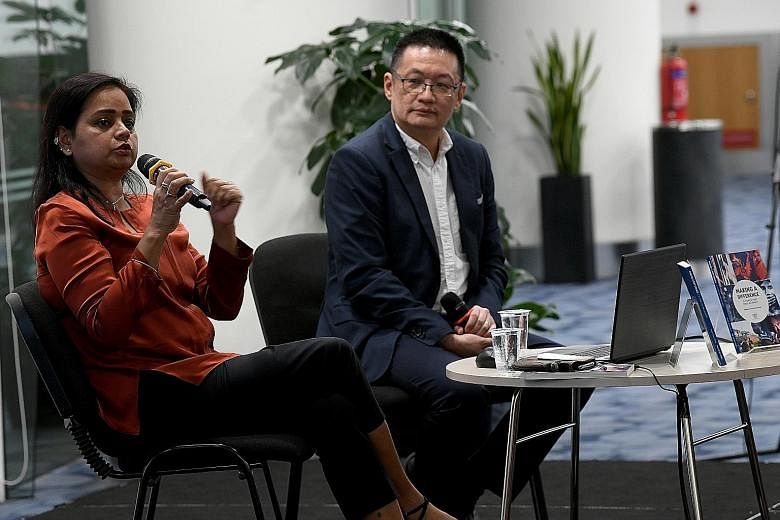An 84-year-old man wrote a letter to The Straits Times after he received a medical bill of thousands of dollars, for which he received only $4.50 in insurance payment.
His letter prompted investigative reporting by the newspaper over four months, resulting in an article that sparked debate in Parliament last January about the adequacy of national healthcare insurance.
It also led to the Government's decision to review national health insurance claim limits every three years instead of five.
The article was among the stories highlighted by ST's Asia News Network editor Shefali Rekhi at a session of The Straits Times Book Club on Wednesday, which was moderated by associate foreign editor Tan Ooi Boon.
They discussed the book, Making A Difference: 25 Stories That Made An Impact, which includes the report on Singapore's health system and other articles by journalists from more than 20 countries.
The journalists unearthed the truth about topics ranging from Malaysia's drug-mule syndicates to how an Austrian politician was filmed accepting campaign support in exchange for public contracts with a Russian multi-millionaire.
Their articles are highlights from World News Day last year, which about 40 newsrooms around the world celebrated on Sept 28 with special editorial content via their print and digital platforms.
World News Day was started in 2018 by the Canadian Journalism Foundation to celebrate the work of journalists and raise awareness of the value of fair and independent journalism.
Ms Rekhi, who is also the ST Asia Report editor, said: "Good journalism takes effort. We can even spend a year or two tackling the root of the problem in a story."
Quality journalism is especially important in a world where information is readily available and fake news is prevalent, noted Mr Tan, who is also supervising editor at the Straits Times Press, which published Making A Difference.
"Today, the challenge faced by journalists is that there's too much information available. Every question has 100 answers.
"You want to search for something, but there are multiple versions available and this makes it difficult to verify information."
Mr Tan, 51, added that journalism helps prevent the spread of fake news, citing the example of the Hong Kong protests.
During the unrest, fake content - for example, in the form of videos and audio recordings resembling real news reports - have resulted in heightened distrust of the police among citizens.
More than 60 people attended the session.
"I learnt that for an article to be neutral, there is a need to cover various perspectives even if it's difficult to achieve total balance," said Samuel Sim, 17, who is waiting to start his tertiary education and is considering pursuing journalism as a career.
• Making A Difference: 25 Stories That Made An Impact is retailing at $21.40 in major bookstores and on the Amazon Kindle store at $5.40.
• At the next Straits Times Book Club session on Feb 26, veteran diplomat Tommy Koh will discuss the new book, Fifty Secrets Of Singapore's Success, with ST's opinion editor Chua Mui Hoong. Curated by Professor Koh, the book is a collection of 50 essays by leaders and experts in Singapore on how the country has achieved success in various areas.


